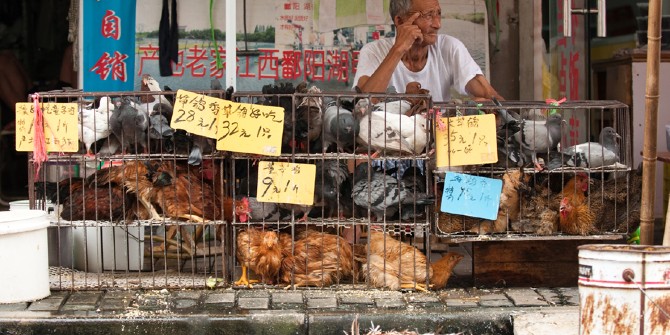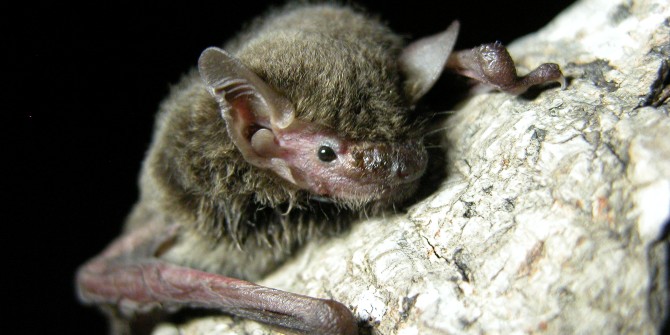Eating wild and intensively-farmed animals is a recipe for more pandemics. Deborah Cao (Griffith University, Australia) says factory farming and the consumption of wild animals needs to end, and China – and the rest of the world – should embrace its long culinary tradition of vegetarianism.
This is a response to Jonathan Birch’s LSE Festival Short, Humans, Animals and Pandemics: What Needs to Change? Join the discussion below.
Humanity needs to learn an important (and bitter) lesson from past zoonotic outbreaks. In 2002-2003, Severe Acute Respiratory Syndrome (SARS) spread from southern China to more than 26 countries in Asia, Europe, and the Americas. As we know, COVID-19 first emerged in China, and the virus very probably jumped from wild animals to humans. Both SARS (or SARS-CoV-1) and COVID-19 (or SARS-CoV-2) seem to be linked to the human consumption of animals and the intensification of wildlife farming in China, an industry supported and encouraged by the Chinese government and worth around US$76 billion before the pandemic started. In the immediate aftermath of the SARS outbreak in 2003, the Chinese authorities ordered the slaughtering of tens of thousands of wild animals and imposed a temporary ban on the trade of wild animals for human consumption in southern China.
However, the crackdown was short lived. Very soon, the Chinese people and the authorities apparently forgot what had happened during the SARS panic. The hunting (both legal and illegal), trafficking, farming, and eating of wild animals resumed, accelerating and expanding across China in the intervening years until early 2020 when a much more devastating zoonotic pandemic hit – again emerging in China, and again likely linked to the human trade and consumption of wildlife.
Anyone who thinks the probability of other zoonotic pandemic outbreaks is low after COVID-19 needs to think hard, and think again. Zoonotic virus outbreaks will inevitably occur if humans continue to behave recklessly and to exploit animals, as the main drivers of zoonoses are anthropogenic.

I believe that it is the Chinese government’s recognition of the extremely serious risk of future zoonotic viruses linked to human consumption of wildlife that prompted China to announce a permanent and comprehensive ban on wildlife eating and related trade shortly after the COVID-19 outbreak. It is a very encouraging and positive step, and it is imperative that other countries around the world, especially the rest of Asia, follow suit, banning the trade, farming, and exploitation of wildlife for human consumption. This move should start internationally with the reform of CITES (the Convention on International Trade in Endangered Species of Wild Fauna and Flora), whose current aim is to ensure that international trade in specimens of wild animals and plants does not threaten their survival – that is, only regulating the trade of wild animals and plants, and not prohibiting it.
Secondly, as Jonathan Birch suggests, intensive animal farming should be discontinued for the sake of humans, animals, and the environment. The inhumane and inherently cruel practices of factory farming – invented in the West and still expanding in developing countries and replacing traditional farm animal practices – is another source of possible zoonotic disease outbreaks. A related threat is antibiotic resistance, with animal-derived food containing antibiotic residues from the use of veterinary drugs and feed additives in intensive animal husbandry and aquaculture. Recent research has indicated that growth hormones, antibiotics, and other chemicals in meat are causing multiple health problems, such as obesity and unnatural sexual development in adolescents in China. The routine use of growth hormones and antibiotics in factory farms is not limited to China, but is prevalent in intensive farming everywhere.
This brings us to what we can do as individuals to address these risks in a post-COVID world. As Birch suggests, we need to change our predominantly meat-based diets. This does not mean that everyone needs to become vegan or vegetarian.
People around the world are familiar with Chinese restaurants and many love Chinese food, but they know little about Chinese vegetarian food culture. Vegetarian cuisine has always been an integral and prominent part of the Chinese diet, enjoyed by all Chinese for thousands of years. It is definitely not limited to tofu! Chinese vegetarian cooking is a sophisticated cuisine in its own right, with an extensive variety of plant-based protein-rich foods, often prepared and cooked to imitate the flavours and textures of meat to entice and appeal to the wider community, not just pure vegetarians. So it is my sincere hope that Chinese vegetarian restaurants will mushroom (pun intended) – not only in China, but all over the world.
This post represents the views of the author and not those of the COVID-19 blog, nor LSE. It is a response to Jonathan Birch’s LSE Festival Short, Humans, Animals and Pandemics: What Needs to Change? Join the discussion and your post thoughts below.






This is VERY important. How do we publicly monitor these bans in the future? How do we get to a world with ZERO wild animals being eaten?